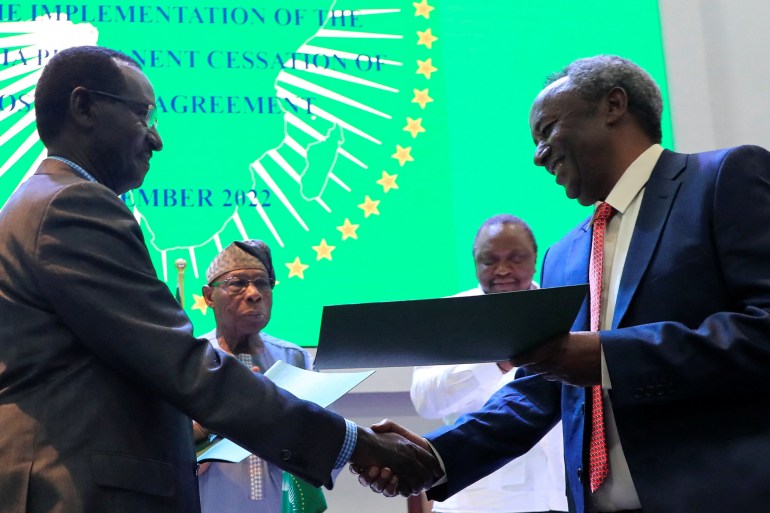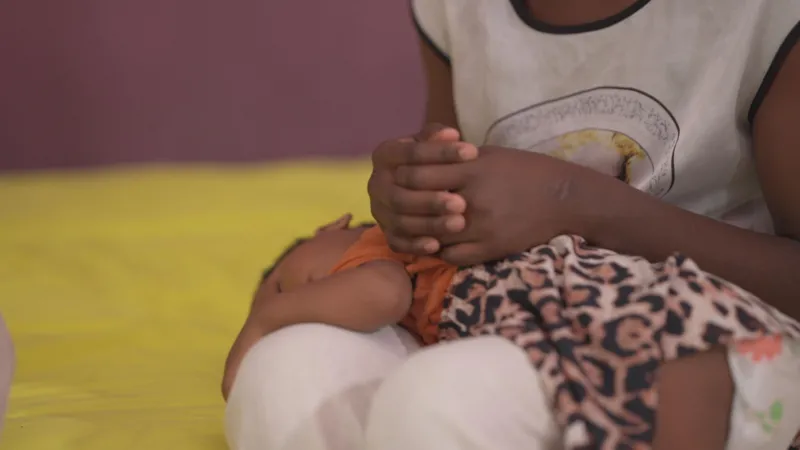Ethiopia’s rival sides agree on humanitarian access for Tigray
The sides agree to move to end the humanitarian crisis in the region, days after signing a November 2 peace deal.

Ethiopia’s government and Tigrayan rebels have agreed to facilitate immediate humanitarian access to “all in need” in war-ravaged Tigray and neighbouring regions.
Saturday’s agreement followed talks in the Kenyan capital Nairobi this week on the full implementation of a deal signed between the warring sides 10 days ago in South Africa to end the brutal two-year conflict in northern Ethiopia.
“The parties have agreed to facilitate unhindered humanitarian access to all in need of assistance in Tigray and neighbouring regions,” a joint statement said.
The agreement was signed by Field Marshal Berhanu Jula, chief of staff of the Ethiopian Armed Forces, and General Tadesse Werede, commander-in-chief of the Tigray rebel forces.
African Union mediator Olusegun Obasanjo said the deal would take “immediate effect”.
Ethiopian legislator Keiredin Tezera told Al Jazeera that aid was being sent to the areas in control of the army even before the agreement was reached on Saturday.
“This agreement may even further facilitate to deliver aid not only to the Tigray region but the neighbouring regions, which are also being affected by the conflict,” he said. “This is big news for us and not only for all of Ethiopia but also for Africa … It is significant beyond Ethiopia.”
The two sides also agreed to establish a joint committee to implement the disarming of Tigray People’s Liberation Front (TPLF) fighters, as stipulated in the ceasefire deal, the statement said.
After little more than a week of negotiations in the South African capital Pretoria, the government of Prime Minister Abiy Ahmed and the TPLF on November 2 signed a peace deal which has been hailed by the international community as a crucial first step in ending the bloodshed.
The deal notably calls for the cessation of hostilities, restoration of humanitarian aid, the re-establishment of federal authority over Tigray and the disarming of TPLF fighters.
Ethiopia’s northernmost region is in the grip of a severe humanitarian crisis due to a lack of food and medicine, and there is limited access to basic services including electricity, banking and communications.
Tigray regional government representative in North America, Yohannes Abraha, said there have been calls for unhindered humanitarian flow to Tigray for a long time.
“There has been very long time, since August, that there has not any humanitarian aid into Tigray,” he told Al Jazeera, adding that nothing had materialised yet after the November 2 peace deal.
Abraha said that, among other reasons, the dire situation on the ground contributed to reaching the Pretoria outcome.
The African Union Commission said it “applauds the parties on these significant confidence-building measures and encourages them to continue towards the full implementation of the Cessation of Hostilities Agreement, as part of overall efforts to end the conflict and restore peace, security and stability in Ethiopia”.
Weaponising starvation
The conflict between the TPLF and pro-Abiy forces, which include regional fighters and the Eritrean army, has caused an untold number of deaths, forced more than two million from their homes and led to reports of horrific abuses such as rape and massacres.
Estimates of casualties have varied widely, with the United States saying that as many as half a million people have died, while the European Union’s foreign envoy Josep Borrell said that more than 100,000 people may have been killed.
UN-backed investigators have accused all sides of committing abuses but also charged that Addis Ababa had been using starvation as a weapon of war – claims denied by the Ethiopian authorities.
Abiy declared last week that his government, whose forces had claimed considerable gains on the battlefield, had secured “100 percent” of what it had sought in the peace negotiations.
On Friday, the government said its forces controlled 70 percent of Tigray and that aid was being sent in – claims swiftly denied by Tigrayan rebels.
Abiy, a Nobel Peace Prize laureate, sent troops into Tigray in late 2020 to topple the TPLF, the region’s governing party, in response to what he said were attacks by the group on federal army camps.
The conflict capped months of simmering tensions between Abiy and the TPLF, which has dominated the national government for nearly 30 years until he took office in 2018.
-al jazeera







